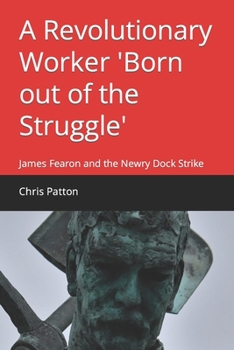A Revolutionary Worker 'Born out of the Struggle': James Fearon and the Newry Dock Strike
The 1907 dock strike in Newry was small in comparison with the earlier events in Belfast but did not lack in intensity. It reflected both the intervention of Syndicalism and the extreme hardship endured by the town's workers. Conditions were appalling, unsafe working conditions, industrial disease, a contaminated environment, and the injustices of the stevedore system contributed to a popular mood of revolt.
The strike may not have had either the scale or dramatic impact of the disputes that preceded and followed it but history is not a series of separate events, rather it is the result of a dynamic and dialectical unfolding of a process of class struggle and the events in Newry and also, which is quite often underemphasised, Warrenpoint and Dundalk represented aspects of that overall historic struggle in their own right. Most significantly it represented a rearguard action in the Larkinite retreat from Ulster weakened by the increasingly victorious utilisation of sectarian forces in Belfast, the intervention of a conservative union bureaucracy, and the transition from north to south of the locus of working class struggle. The mechanics of that transition appears with increasing clarity during that process.
The reasons for the defeat of the strike were clear enough, it was faced with a dominant group of employers that were ideologically irreconcilable with the existence of Trade Unionism and who had at their disposal the means of crushing it. What does complicate it however is the ambiguous role of nationalist business interests. Although the confrontation between the dockers and the unionist elite took front and centre stage the unstable posturing and indeed antipathy of the nationalist middle class was visible on the wings, revealing that underlying the programme of the Irish nationalist bourgeoisie, in spite of the obvious tensions, was a willingness to collaborate practically with their unionist counterparts when it came to controlling the aspirations of the broader working masses.
By the advent of the early twentieth century strike wave the political and economic conditions were already in place which disfigured the coming period of revolt and Ireland had a working class that was deeply split with the workers in the most industrialised section of the economy increasingly dominated by sectarian factions and sentiment and in a political bloc with the pro-imperialist Irish industrial bourgeoisie.
The dispute is seldom referred to as a lockout but the participation of both nationalist and unionist employers in locking out union members is what defined it in the end. It was much less of a footnote to the bitter demise of the Belfast coal strike than a prelude to the open class antagonisms within nationalism that were to develop in the Cork disputes of 1908 and 1909 and which became increasingly distilled, ultimately revealing themselves fully during the events in Dublin in 1913.
An enduring myth surrounding the defeat of the strike centres on the personality of James Fearon, who is criticised for taking an impetuous approach which it is argued, led to disaster. A close look at the events of the dispute, and the attempts to resolve it, finds little in the way of evidence that Fearon acted in any way that could be regarded as hasty or unreasonable. Fearon was a native of the town and the trials and tribulations of his family present a sadly detailed picture of the conditions of working class life. He was a political person, previous impressions of him as 'emotive' tends to detract from his commitment to revolutionary socialism which beyond doubt he had devoted his life to. His experience in Glasgow, where he met Larkin, prior to his return to Newry and his subsequent role in the Clyde Workers' Committees and the Glasgow IRA before his return to attempt the building of the Communist Party of Ireland along with Roddy Connolly attests to a consciously political life.
.
Related Subjects
History




